Khamenei’s Twitter Removes ‘Talks Are Going Well’ From His Remarks
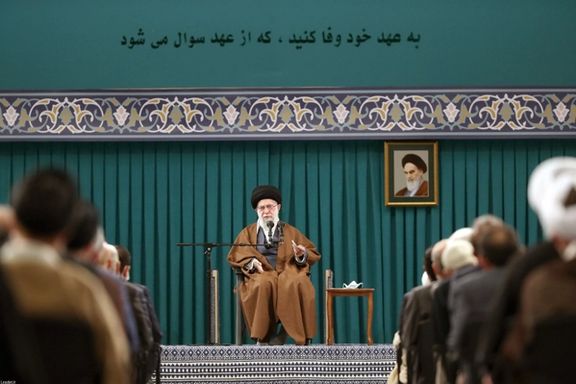
The twitter account of Iran’s Supreme Leader Ali Khamenei has deleted the phrase "the nuclear talks are going well” from remarks he made on Tuesday.

The twitter account of Iran’s Supreme Leader Ali Khamenei has deleted the phrase "the nuclear talks are going well” from remarks he made on Tuesday.
In a meeting with a group of senior Iranian officials Khamenei had said the talks “are going well while the Iranian negotiating team will continue to inform the president, the Supreme National Security Council and other officials on the process, make relevant decisions, and move forward”.
However, in the new post on Wednesday replacing the earlier one, the first part of the sentence was changed to “The country's diplomacy is moving in the right direction”.
Following the revised tweet, several social media accounts close to Saeed Jalili, a former secretary of the Supreme National Security Council, wrote that Khamenei had not made such a statement, and that the post was "an example of lies and distortion”.
Jalili, who was Iran's top nuclear negotiator under former president Mahmoud Ahmadinejad from 2007 to 2013, is a leading members of a so-called “principlist” group described as the "extreme end of the fundamentalist camp" and "Iran’s most right-wing party", and staunch critic of the original 2015 deal.
During the past weeks, some lawmakers who are also members of the party, including Mahmoud Nabavian and Ali Khezrian criticized the Vienna talks, saying that the possible agreement was practically no different from the JCPOA, which they opposed. Some believe that their criticism is a response to the removal of Hamidreza Asgari, who is close to Jalili– from the negotiating team.

Iran’s Supreme Leader says talks to revive the 2015 deal “are going well,” calling on nuclear negotiators to continue "resisting America's excessive demands".
Ali Khamenei made the remarks in a meeting with heads of the three branches of government and several other current and former senior Iranian officials on Tuesday.
Negotiations that started more than a year ago in Vienna to restore the Iran nuclear agreement known as JCPOA stalled in March, with both Iran and the United States blaming each other for lack of "political will" to settle remaining issues.
"Absolutely do not wait for nuclear negotiations in planning for the country and move forward. Do not let your work be disrupted whether the negotiations reach positive or semi-positive or negative results," he said.
One of the unresolved issues is whether Washington would remove Iran's Revolutionary Guards (IRGC) from the US list of Foreign Terrorist Organization (FTO), as demanded by Tehran, for the deal to be revived.
Referring to the US exit from the JCPOA, Khamenei said it was Washington that failed to remain committed to its obligations, saying, "The United States broke its promises and now they have reached a dead end while Iran is not in such a situation”.
In 2018, then-president Donald Trump left the deal and reimposed ‘maximum pressure’ sanctions that have crippled Iran's economy. A year after the US withdrawal, Iran started to enrich uranium beyond the limits imposed on its nuclear program by the 2015 agreement that was supposed to make it harder to develop a bomb.
Khamenei said the fact that “arrogant Americans” explicitly acknowledge that ‘maximum pressure’ sanctions on Iran have failed “miserably” is a very important issue that should not be forgotten.
Referring to Iran’s situation he said, “There are problems, but they can be solved”. The economic indicators should not be the only basis for evaluating and judging the situation of the country and other indicators should also be considered, he added.
About criticizing the performance of the government that is being blamed for failing to deal with economic hardship, Khamenei said that “criticism should be based on an optimistic view and should not dispirit people”.
He also talked about recent developments across the region, particularly in Yemen and Israel.
He lauded the Palestinian youths’ “awakening, dynamism and hard work in their confrontation with the Israeli occupation”, adding that the recent attacks “showed that Palestine is alive despite the attempts of the United States and its stooges…With a continuation of the ongoing activities, the Palestinian people will achieve a final victory with God’s blessing”.
Israel is facing a new wave of deadly attacks, including shooting rampages and stabbings, during the Muslim holy fasting month of Ramadan that has claimed the lives of at least 14 people so far. Iran-backed Lebanese Hezbollah and Palestinian militant group Hamas as well as Iranian hardliners and media affiliated with the Revolutionary Guard have been cheering the growing violence.
Khamenei also praised the UN-brokered ceasefire recently announced in Yemen as “a very good move” and glorified “Yemeni people’s bravery in facing the Saudi-led aggression against their country”.
Addressing the Saudis, he said “Why do you go ahead with the war that you already know there is no possibility [for you] to win? Find a solution and get yourselves out of this arena”.
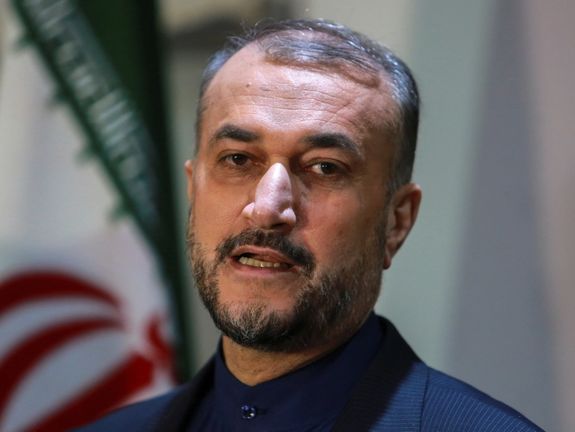
There is no draft agreement from the Vienna nuclear talks to be able to pass judgement, a senior Iranian lawmaker told the official IRNA news agency in Tehran.
Mahmoud Abbaszadeh Meshkini, chairman of parliament’s national security and foreign policy committee spoke with IRNA about a meeting on Monday between committee members and Foreign Minister Hossein Amir-Abdollahian. He said lawmakers received “a serious and comprehensive briefing” from the minister and Iran’s chief nuclear negotiator, Ali Bagheri-Kani.
Meshkini said that based on the report lawmakers heard, there is no draft agreement in the Vienna talks to be debated by members of parliament (Majles).
Iran’s legislature is dominated by hardliners, who have been warning the government not to violate Iran’s “red lines” in the nuclear talks. The most important condition is reportedly Tehran’s demand from the United States to remove the Revolutionary Guard (IRGC) from the Foreign Terrorist Organization list.
Meshkini also said that the negotiating parties in Vienna have kept notes from their meetings, but there are still differences. He added that these notes are not a final draft agreement, as each side still makes demands and the other side resists. But Meshkini emphasized that Iran’s “revolutionary government” will not make concession. On the contrary, Iran is in a stronger position to demand concessions “and we see a good future.”
Last week, some lawmakers claimed they had seen the draft agreement and began criticizing the government for having conceded too much in Vienna.
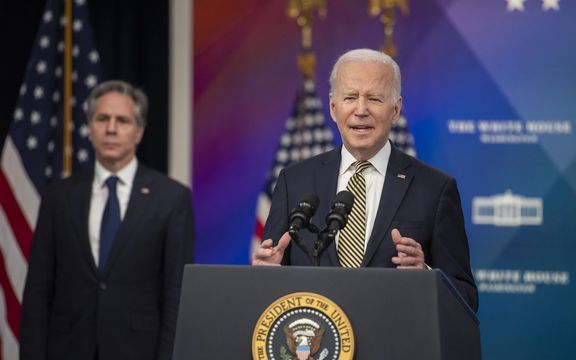
In two separate initiatives Monday, opponents of removing Iran’s Revolutionary Guard from a US terrorist list urged President Joe Biden not to take such a move.
In one initiative, 70 experts writing to Biden told him that removing the Revolutionary Guard “would threaten American lives, harm Gold Star Families, and empower a terrorist organization sponsoring daily attacks against U.S. interests and allies. The delisting would be strategically shortsighted and dangerous to U.S. national security interests.”
Negotiations that started in Vienna in April last year to restore Iran’s 2015 nuclear deal known as JCPOA came to a halt in March as Tehran reportedly demanded the removal of its Islamic Revolution Guard Corps (IRGC) from the US Foreign Terrorist Organization (FTO) list.
In a second initiative, 14 Republican Senators, led by Sen. John Kennedy of Louisiana sent a letter to the White House urging President Biden not to remove the IRGC designation as a terrorist organization that they said is “responsible for hundreds of American deaths.” The Senators also voiced their opposition to a new nuclear deal with Iran that would provide Tehran with billions of dollars of sanctions relief and frozen funds.
“Not only would this removal be wildly misguided, but it would betray our partners and allies in the region—particularly Israel and the Gulf states. These allies and partners already hold concerns that the United States is reducing its regional presence. The enactment of such a deal would provide the Iranian regime access to funds that it would use to destabilize the region through terrorist proxies,” the Senators said.
Opposition to such a move intensified last month with most Congressional Republicans and some Democrats appealing on various occasions to the White House not to consider making a concession.
Last week, signals emerged form the administration that President Biden was opposed to removing the IRGC from the FTO list, but other signs pointed to the possibility that the US might take such a step while keeping the designation of IRGC’s extraterritorial Qods (Quds) Force as a terrorist organization.
In March, 49 Republican Senators issued a statement urging President Biden not to revive the JCPOA without Congressional approval. “The administration has thus far refused to commit to submit a new Iran deal to the Senate for ratification as a treaty, as per its constitutional obligation, or for review under statutory requirements that passed on a bipartisan basis in response to the 2015 deal,” they said.
The 70 experts who wrote to Biden on Monday pointed out that the IRGC “is engaged in active terrorist plots to kill former U.S. government officials,” referring to explicit Iranian threats to kill high-ranking officials of the Trump administration, including former Secretary of State Mike Pompeo.
Among the signatories were former State Department Special Envoy for Venezuela and Iran Elliot Abrams, Ilan Berman of the American Foreign Policy Council, Amb. Paula Dobriansky, former Under Secretary of State for Global Affairs, former US Senator Joe Lieberman and former US National Security Advisor Robert McFarlane.
The letter concluded by saying, “Mr. President, no deal can be worth giving terrorists a green light to kill Americans, empowering a terrorist organization to harm U.S. interests and allies, or turning our backs on American victims of terrorism. For the sake of our national security, we implore you to maintain the IRGC’s FTO designation.”
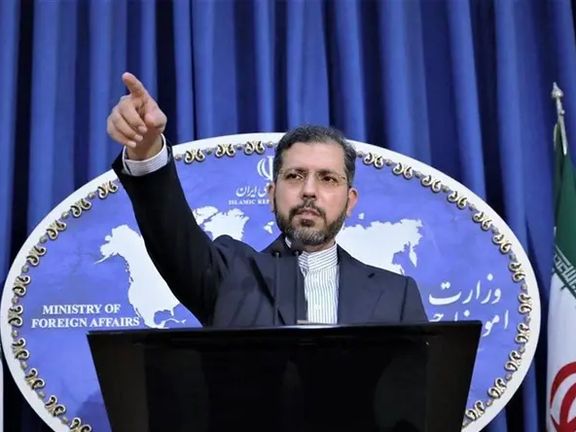
The US has not yet “shown the necessary will” to agree on renewing the 2015 Iran nuclear deal, the Iranian foreign ministry spokesman said Monday.
"What has remained is more than one issue,” Saeed Khatibzadeh told reporters at his weekly press briefing. “All components of maximum pressure need to be removed.”
US ‘maximum pressure’ sanctions have been in place since 2018, when President Donald Trump withdrew the US from the 2015 agreement, the JCPOA (Joint Comprehensive Plan of Action), prompting Tehran by 2019 to expand its nuclear program beyond JCPOA limits.
A deal could have been concluded "months ago" had Tehran surrendered to US demands over its “red lines,” Khatibzadeh said. The spokesman reiterated that the "opportunity for dialogue" would not "remain open forever."
The US and Iran reportedly disagree over whether reviving the JCPOA should see the US remove the Iranian Revolutionary Guards (IRGC) from its list of ‘foreign terrorist organization,’ where Trump placed them in 2019. President Joe Biden’s administration, while committed to restoring the JCPOA, has apparently decided not delist the Guards, the only part of any state’s armed forces so designated, in the face of Congressional opposition to delisting from most Republicans and some Democrats.
The foreign ministry spokesman repeated Iran’s view that the sticking point in talks was the US and not the other world powers with whom Iran has for a year been discussing restoring the JCPOA – China, France, Germany, Russia, and the United Kingdom.
Referring to criticism of lawmakers from the principlist Paydari group, who have claimed Iranian negotiators have made too many concessions in a draft agreement over JCPOA revival, Khatibzadeh said there was "no final text."
"We have not yet reached the point where the American side demonstrates that it is fulfilling its obligations," Khatibzadeh said, claiming the US wanted to maintain as many of its sanctions as possible. His comments came a day after Foreign Minister Hossein Amir-Abdollahian said Sunday the US had presented "new conditions" for removing ‘maximum pressure.’
Iranian media and politicians who support the JCPOA have criticized the government over the talks. In a commentary Monday, Jomhouri Eslami newspaper said it should not have claimed over recent months that talks were near agreement or that Iran’s current economic problems would be solved irrespective of sanctions. "What matters is delivering on these promises,” the conservative paper noted.
Jomhouri Eslami linked US sanctions to rising prices. "Seven months appears to be enough time for the new government to take control of the affairs of the country and stop prices from rising,” it opined. “But many commodities have risen by between 50 to 80 percent during this time and pressure on people has doubled.”
Jomhouri Eslami urged the government of President Ebrahim Raisi "to seek help from those who have successful experience in this matter," presumably a reference to those who conducted earlier international talks under the presidency of Hassan Rouhani.
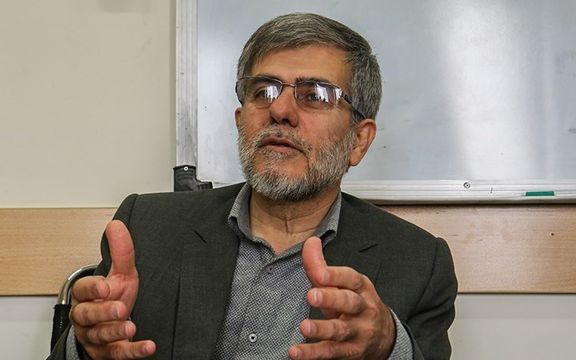
Iran's former nuclear chief Fereydoun Abbasi says Iranian lawmakers have not officially received a copy of a new nuclear agreement drafted in the Vienna talks.
However, several members of the Iranian parliament (Majles) claim that they have read the text of a new agreement between Iran and the United States.
Abbasi, who is currently an member of parliament from Kazeroun in Fars province and a member of the parliament's Energy Committee, told the Iranian Labor News Agency (ILNA) on Sunday that Iran’s negotiators have never briefed lawmakers on the nuclear talks, and the speaker of the Majles has also not shared an official text with MPs.
Abbasi’s remarks come while 250 lawmakers who wrote a letter to President Ebrahim Raisi telling him not to accept any agreement without a US guarantee to uphold the deal, claim to have seen the draft of an agreement.
Last week, hardliner lawmaker, Mahmoud Nabavian, a Paydari Party member, said in an interview with Fars News Agency that he and some other members of the parliament have already read the text exchanged between the Iranian and US negotiators. Incidentally, what the lawmakers wrote in the letter to Raisi on Sunday, was identical to what Nabavian had called for in terms of guarantees.
Reading Abbasi’s remarks carefully, he did not explicitly deny that a text is circulating among lawmakers. What he said was that an official version was not shared with parliament members.
He reiterated that "Unfortunately, no one in Iran has told us what has been going on between the Iranian and US negotiators." He stressed that both the Energy Committee and the National Security Committee have been left in the dark about the negotiations.
Abbasi sounding upset warned that [the officials] should not play with the Majles, adding, "under the circumstances, we cannot offer any advice to the Majles."
When he was told that it appears to outsiders there are good ties between the parliament and the administration, Abbasi said: "The information we need is not communicated to us. I have even asked other MPs whether they have been given any new insight, but it appears that we lack the information that would enable us to defend the negotiators."
Abbasi further said: "We still do not know why the other side refuses to lift the sanctions. We do not know if they have a point to make about the Islamic Revolution, Iran's defensive power, or Iran being an emerging global power.”
He added: "The two sides have no problem regarding the nuclear issue. The 2015 agreement, the Joint Comprehensive Plan of Action (JCPOA) had made everything clear and we had accepted it, although it was not in our interest. And we were carrying it out. Why didn't they [the US side] fulfil their commitments? This is what the negotiators should come forward and tell us."
Asked why Paydari members oppose the nuclear talks, Abbasi said: They are wise men, and they are not obstructionists. Of course, they are party members, but at the same time, they have their independent ideas.
Meanwhile, Abbasi who is known to be linked to Paydari, denied his membership in the party. "My problem with the negotiations is that the negotiators haven not told us anything about it."